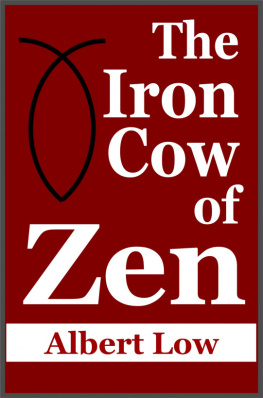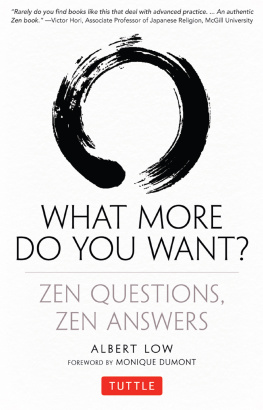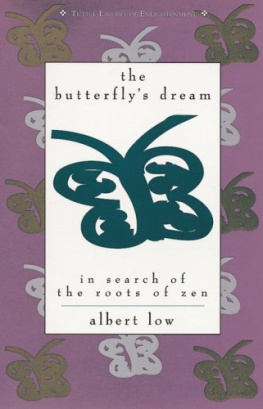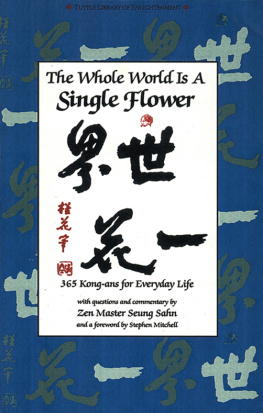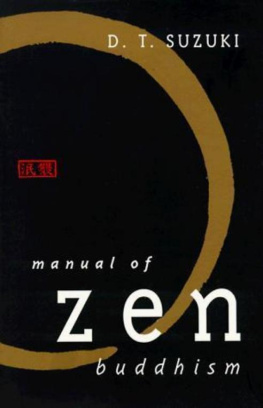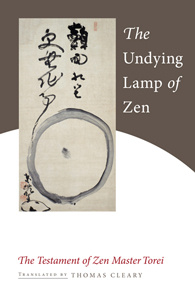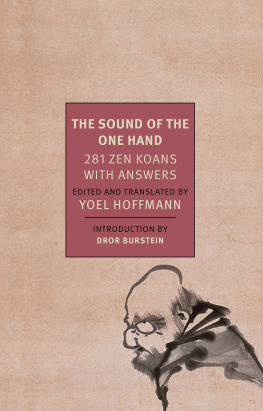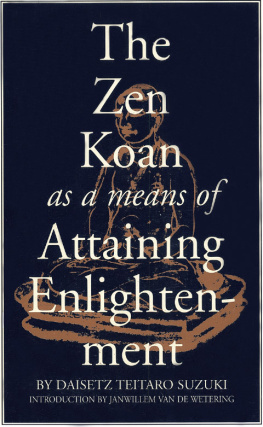Albert Low - The Iron Cow of Zen
Here you can read online Albert Low - The Iron Cow of Zen full text of the book (entire story) in english for free. Download pdf and epub, get meaning, cover and reviews about this ebook. year: 2009, publisher: Albert Low, genre: Religion. Description of the work, (preface) as well as reviews are available. Best literature library LitArk.com created for fans of good reading and offers a wide selection of genres:
Romance novel
Science fiction
Adventure
Detective
Science
History
Home and family
Prose
Art
Politics
Computer
Non-fiction
Religion
Business
Children
Humor
Choose a favorite category and find really read worthwhile books. Enjoy immersion in the world of imagination, feel the emotions of the characters or learn something new for yourself, make an fascinating discovery.
- Book:The Iron Cow of Zen
- Author:
- Publisher:Albert Low
- Genre:
- Year:2009
- Rating:5 / 5
- Favourites:Add to favourites
- Your mark:
- 100
- 1
- 2
- 3
- 4
- 5
The Iron Cow of Zen: summary, description and annotation
We offer to read an annotation, description, summary or preface (depends on what the author of the book "The Iron Cow of Zen" wrote himself). If you haven't found the necessary information about the book — write in the comments, we will try to find it.
Albert Low: author's other books
Who wrote The Iron Cow of Zen? Find out the surname, the name of the author of the book and a list of all author's works by series.
The Iron Cow of Zen — read online for free the complete book (whole text) full work
Below is the text of the book, divided by pages. System saving the place of the last page read, allows you to conveniently read the book "The Iron Cow of Zen" online for free, without having to search again every time where you left off. Put a bookmark, and you can go to the page where you finished reading at any time.
Font size:
Interval:
Bookmark:
By
Albert Low
rev 2016.05.25
Copyright 2009-2016 Albert Low
Distributed by Smashwords
ISBN 978-0-986-63185-6
www .smashwords.com/profile/view/zenAuthor
www .albertlow.ca
License Notes: This ebook is licensed foryour personal enjoyment only. This ebook may not be re-sold orgiven away to other people. If you would like to share this bookwith another person, please purchase an additional copy for eachperson you share it with. If youre reading this book and did notpurchase it, or it was not purchased for your use only, then youshould return to Smashwords.com and purchase your own copy. Thankyou for respecting the hard work of this author and helping us keepeBooks DRM free..
If you find any errors in the formatting ofthis book (spelling mistakes, etc), please email us at:awlbooks@shaw.ca. We will provide you with a free update once theerrors have been corrected.
Thank you for purchasing this ebook. When youare finished reading, won't you please take a moment to rate it andwrite your review on the retailers website where you purchased it?Reviews help other readers like yourself make more informedpurchase decisions. Thank you.
This book was first published in print in1985 by Quest Books.
Table of Contents
At the top of a one hundred foot pole
What must we do? Where can we go?
It is when we awaken to the fact that we are,as it were, at the top of a one hundred foot pole that we firstseriously ask these questions. Life is lived at the frontier ofexistence, each step a step into the unknown, each momentcompletely new. But we pretend there is a road of life along whichwe can walk, that there is an enduring world and that we can repeatthings, that each breath is the same as a previous breath. Wepretend all of this in the face of the overwhelming evidence to thecontrary and we make believe that reality is an enduringsomething which goes from the past to the future through thepresent.
Sometimes, however, the road of lifecollapses into a point, a moment - at the top of a hundred footpole. The pretenses break down and we are swept by a vertigo oftransience and are filled by a fear of plunging into an abyss ofnothing. A moment of true perception, coming from failure, loss,our basic aloneness, or the precariousness of existing, is all thatit takes to shatter this complacency about a real enduringworld.
How often too in life do we arrive at a pointwhere we feel blocked and anxious, where we cannot go forward orbackward: as though at the top, as it were, of a hundred foot pole?I have to give up, I cant go on, I cant make it, What isthe use anyhow? Why go on, why bother But there is noalternative, life does go on, we cannot give up. Even suicide isits own way of going on.
It is not only individual lives that reach animpasse. Our collective life on earth seems to have reached animpasse of its own. No one needs to be told that we live in verytroubled times. From whatever angle we look there are problems anddangers. The technological cornucopia creates one vast heap ofwaste; attempts to feed the worlds populations accelerate soilerosion; our hunger for fuel destroys the quality of our life,while our attempts to preserve that quality of life threaten oursurvival in an economic world of eat or be eaten; medicaldiscoveries threaten us with over population, and the rapidadvances in automation, computer and electronic gadgetry, dazzle uswith promises while delivering confusion; the restoration offreedom and dignity to the people of the Third World ushers in thethreat of irresolvable inflation with a potential collapse of ourfinancial structure. In the midst of it all, ugly, black andsinister, are the missiles, pointing to the heart of mankind, but amere motion of a finger away from homing to that heart with all theconsequences that would entail. Something must be done, butwhat?
Where can we go? We have to go forward. Wehave been rushing downhill on a road to future glory too long to beable to apply the brakes, but is it not just this rushing forwardthat courts disaster? If we stop the rush long enough to look atour predicament, we find our world poised uneasily, like a hugeiron cow on the top of a hundred foot pole.
How can we get back on to the road of life?We can only hope to change the world if we ourselves are changed.It is of little value to struggle with the worlds problems whileignoring our own personal problems, and we cannot put the worldright until we have put ourselves right. Each has equalresponsibility. If we do not struggle to overcome the war in ourown hearts, all the peace conferences, all the marches anddemonstrations, protests and complaints that are made for peace andagainst war will be to little avail. A big war is, after all, madeup of a million small wars that have gone beyond a flash point andspun out of control. The basic issues of our times are the basicissues of each one of us.
The very extreme the world has got to musttell us that the world is not populated by angels called us anddemons called them, but by men, women and children. Each of ushas our own quota of pain and confusion, and to blame others, tocall upon them to change, to say the world would be a better placewithout them, simply adds to this pain and confusion, theirs andours. But how do we change ourselves, what is it that must bechanged and what is the Way?
In this book we shall touch on various ways,but Zen Buddhism has been the way followed and practiced by theauthor for more than twenty-five years. Zen Buddhism originated,according to tradition, when Shakyamuni Buddha, instead of giving atalk, held up a flower before an assembly of monks. Only one monk,Mahakasyapa, understood and smiled. A flower and a smile, a flowerthat is a smile, this is Zen Buddhism. It is the direct entry intothe truth of the world as one vast smile, a living flower. It isfar from the gloomy, pessimistic Buddhism that seeks vacancy and isworld denying, that was introduced to Europe and America bytranslators unable to see the truth hidden in the obscurity ofstyle and manner of a culture quite different from their own. Zenis yea saying. Not in the manner of some hearty optimist, backslapping and laughing, while calling on everyone to cheer upbecause things always turn out for the best. Quite the contrary. Itis by seeing that all props and reassurances, all havens of restand harbors from storms are illusory and unnecessary, that weawaken to the security of One Mind.
The Zen tradition, because it sees no need tocreate a bulwark against the erosion of time, has not prizedknowledge and learning for its own sake. Absolute truth, absolutegoodness, indeed any and all absolutes, it regards as symptomsindicating the sickness is in an advanced state. All absolutes cando no more than get us to the top of a hundred-foot pole. Thequestion then is how to take yet another step. Zen Buddhism,therefore, is not a philosophy, theology or psychology, but apractice. In the practice of Zen one assuages the thirst forthe absolute by taking a further step.
This next step is Awakening: the iron cowgives birth. Awakening is the heart of Buddhist practice. Buddhameans awakened one and everyone can awaken. With awakening, thedream of being a separate, isolated individual, with its attendantfear and frustration, fades; while wisdom and compassion, inherentin us all, develop naturally. This has been the message of ZenPatriarchs and Masters over the past fifteen hundred years.
Most of what is written in this book is basedupon experience and observation. If you find something difficult toaccept, then it is suggested that you observe yourself rather thantry to reason about it from statements made elsewhere in this bookor books by other authors. If it is still difficult to accept, thenset it aside for the time being. If you find any sectionparticularly difficult, then leave it and return to it later. In away the whole book should have been written before any chapter wasstarted, and ideally all chapters should be read at once. It wouldbe best, therefore, if at all possible, for the book to be read atleast twice.
Font size:
Interval:
Bookmark:
Similar books «The Iron Cow of Zen»
Look at similar books to The Iron Cow of Zen. We have selected literature similar in name and meaning in the hope of providing readers with more options to find new, interesting, not yet read works.
Discussion, reviews of the book The Iron Cow of Zen and just readers' own opinions. Leave your comments, write what you think about the work, its meaning or the main characters. Specify what exactly you liked and what you didn't like, and why you think so.

